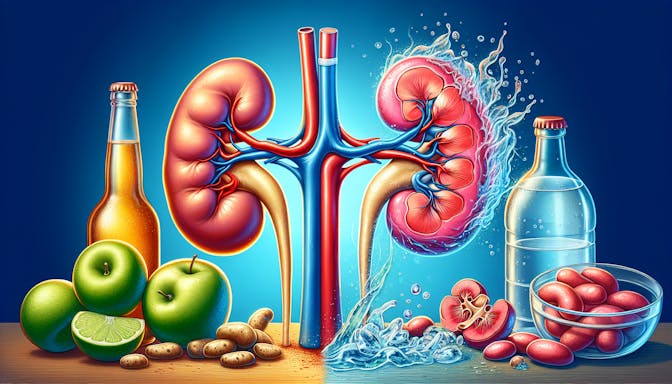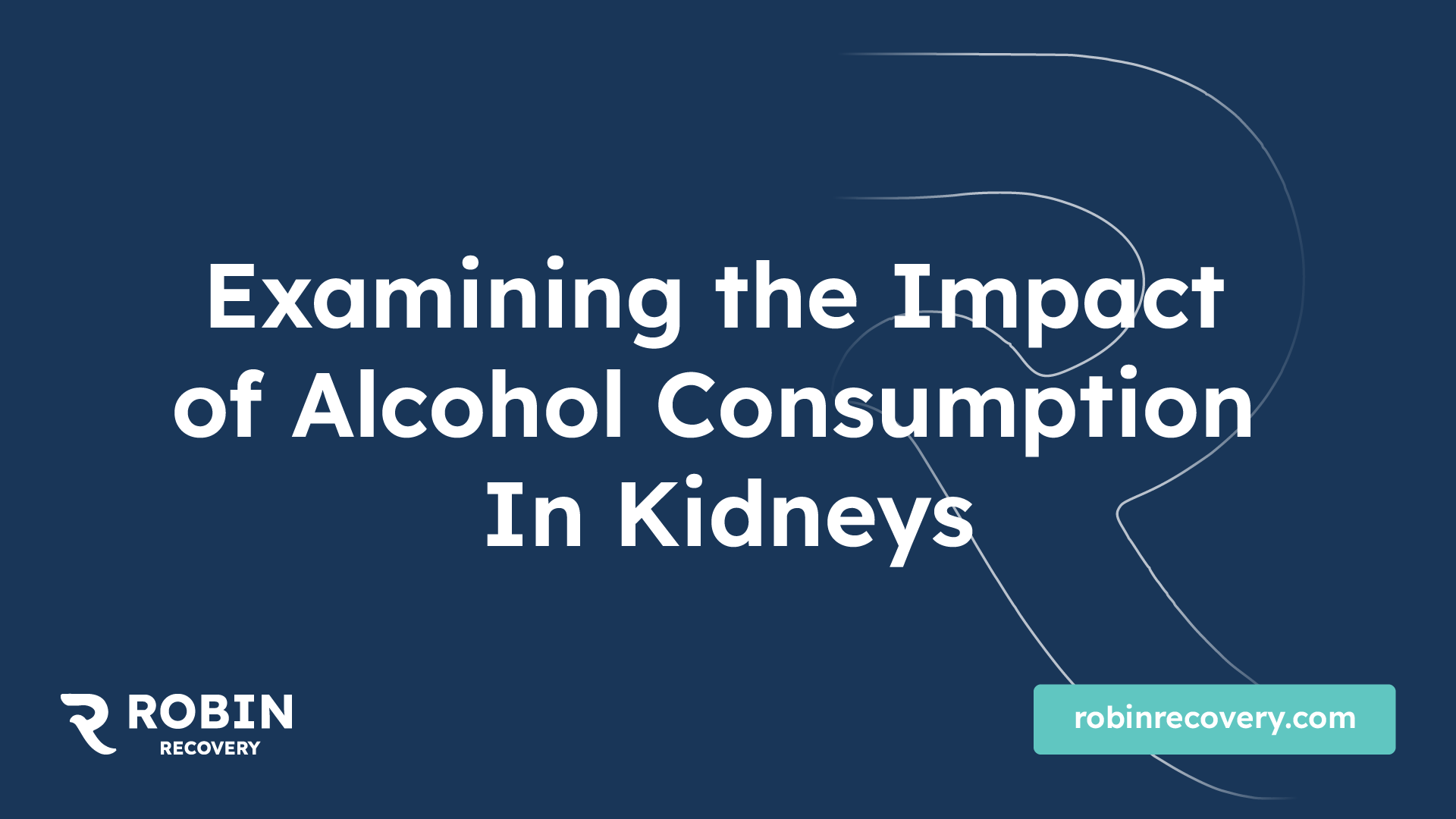Examining the Impact of Alcohol Consumption In Kidneys

Alcohol's Impact on Kidney Function
Alcohol, in both acute and chronic consumption, can significantly impact kidney function. "Does alcohol affect the kidneys?" is a question that garners much attention and concern, and rightfully so. Alcohol-related changes in the kidneys can disrupt their ability to regulate fluid and electrolyte balance, and even lead to severe alterations in the body’s acid-base balance.

Effects of Acute Alcohol Consumption
Acute alcohol consumption, or drinking a large amount of alcohol in a short period, can harm the kidneys' ability to filter blood. This can lead to dehydration and potentially impact the normal functioning of cells and organs, including the kidneys. Binge drinking, in particular, can elevate blood alcohol levels to dangerous levels, causing a sudden decline in kidney function, known as acute kidney injury. In severe cases, acute kidney injury may result in lasting kidney damage or necessitate dialysis until normal kidney function is restored.
Effects of Chronic Alcohol Consumption
Chronic alcohol consumption, on the other hand, can lead to long-term consequences for kidney health. Chronic alcoholic patients may experience low blood concentrations of key electrolytes due to impaired kidney function. Alcohol can also disrupt the hormonal control mechanisms that govern the functioning of the kidneys [2].
Furthermore, chronic alcohol consumption can contribute to liver disease, which can overload the kidneys as they work to filter blood. This is particularly common among patients in the United States who have both liver disease and associated kidney dysfunction due to alcohol dependency [1]. Heavy drinking, defined as consuming more than three drinks in a day for women and more than four drinks in a day for men, can double the risk of kidney disease by requiring the kidneys to work harder, potentially leading to kidney-related complications [1].
In conclusion, both acute and chronic alcohol consumption can have a significant impact on kidney function, highlighting the importance of moderation and responsible drinking habits.
Heavy Drinking and Kidney Health
Heavy drinking, defined as the consumption of an excessive amount of alcohol over a prolonged period, can have detrimental impacts on kidney health. The question often arises: does alcohol affect the kidneys? The simple answer is yes, and in the following sections, we delve into the specifics of how heavy drinking interacts with kidney function.
Heavy Drinking Guidelines
According to the National Kidney Foundation, consuming more than three drinks in a day for women and more than four drinks in a day for men is considered heavy drinking. Here, a standard drink refers to 14 grams of pure alcohol, typically found in 12 ounces of beer, 5 ounces of wine, or 1.5 ounces of distilled spirits.
Risk of Kidney Disease
Heavy drinking can have substantial negative effects on kidney health. Excessive alcohol consumption can harm kidney function by affecting the kidneys' ability to filter blood, leading to dehydration and potentially impacting the normal function of cells and organs, including the kidneys [1].
Furthermore, chronic alcohol consumption can contribute to liver disease, which can overload the kidneys as they work to filter blood. This is particularly common among patients in the United States who have both liver disease and associated kidney dysfunction due to alcohol dependency.
Regular heavy drinking has been found to double the risk of chronic kidney disease, which does not go away over time. Even higher risk of kidney problems has been found for heavy drinkers who also smoke [3].
In conclusion, while moderate drinking may not directly harm the kidneys, heavy and chronic alcohol consumption can pose serious risks to kidney health. Awareness and understanding of these risks are essential for making informed decisions about alcohol consumption.
Binge Drinking and Kidney Function
In the context of understanding how alcohol can affect the kidneys, it's crucial to focus on the particular risks associated with binge drinking.
Definition of Binge Drinking
Binge drinking is defined as consuming more than four to five drinks within a two-hour period. This level of consumption can elevate blood alcohol levels to dangerous levels, potentially leading to significant health consequences [1].
Acute Kidney Injury
One of the serious potential outcomes of binge drinking is a sudden decline in kidney function, known as acute kidney injury. This condition can cause a significant disruption in the kidneys' ability to filter the blood, thereby affecting the body's ability to regulate fluid and electrolytes.
Acute kidney injury may require dialysis until normal kidney function is restored, and in severe cases, it can result in lasting kidney damage [1].
Further research has suggested that alcohol-induced oxidative stress, resulting from increased production of reactive oxygen species (ROS), may contribute to kidney dysfunction [4]. These ROS can cause cellular damage and trigger tissue injury in the kidneys, further adding to the potential harm caused by excessive alcohol consumption.
It's also important to note that alcohol-related damage to other organs, such as the liver, heart, and intestines, can promote pathological processes that can be harmful to the kidneys. However, these mechanisms have not yet been validated experimentally in the kidney [4].
These insights underline the potential risks of binge drinking to kidney health, emphasizing the need for awareness and moderation when it comes to alcohol consumption. It's clear that the question "does alcohol affect the kidneys?" can be answered with a resounding "yes", particularly in the context of binge drinking.
Alcohol and Kidney Disease Risk Factors
In understanding how alcohol affects the kidneys, it's essential to consider the various risk factors that increase the likelihood of kidney disease. Specifically, we'll look at the influence of blood pressure and the complications from liver disease.
Blood Pressure and Kidneys
One of the significant concerns in the context of alcohol consumption and kidney health is blood pressure. Alcohol can cause changes in the function of the kidneys, making them less able to filter the blood, subsequently affecting the body's ability to regulate fluid and electrolytes.
Moreover, excessive alcohol consumption, defined as more than two drinks a day, can increase the chance of developing high blood pressure, a common cause of kidney disease. High blood pressure can also be further exacerbated by alcohol.
It's crucial to understand that high blood pressure can cause damage to the kidneys over time, impairing their ability to effectively filter toxins and waste from the blood.
Liver Disease Complications
Another factor to consider is the impact of liver disease on kidney function. Established liver disease impairs the balancing act of blood flow to the kidneys, which can lead to associated kidney dysfunction.
Excessive drinking, defined as more than four drinks daily, can worsen kidney disease, and binge drinking can even lead to acute kidney failure. Moreover, regular heavy drinking has been found to double the risk of chronic kidney disease, which does not go away over time. This risk is even higher for heavy drinkers who also smoke.
These factors highlight the importance of understanding the impact of alcohol consumption on kidney health and the need for moderation to mitigate these risks.
Moderation and Kidney Health
While alcohol's impact on the kidneys is a concern, it's crucial to note that moderation plays a key role in maintaining kidney health.
Safe Alcohol Consumption Levels
The question, "does alcohol affect the kidneys?" is a common one. Based on the most recent scientific evidence, sticking to one standard alcohol drink each day does not increase the risk of developing kidney disease. A standard alcohol drink is defined as one 1.5-oz shot, one 12-oz. glass of beer, or one 5-oz. glass of wine. Consuming alcohol within these limits does not appear to worsen kidney disease or increase the likelihood of someone with kidney disease requiring dialysis.
However, it's important to remember that overconsumption can be harmful. Drinking too much alcohol can cause changes in kidney function, making them less able to filter blood. It can affect the ability of the kidneys to maintain the right amount of water in the body and cause dehydration, impacting the normal function of cells and organs, including the kidneys.
Consultation with Healthcare Providers
For most individuals, the risk of developing kidney disease is minimally affected by alcohol consumption. While it may be safe for those with kidney disease to have an occasional drink, caution is advised.
Given the potential risks, it's important to consult with healthcare providers before consuming alcohol, especially for individuals with kidney disease. Healthcare providers can provide personalized advice based on individual health status and lifestyle.
The general guideline suggests no more than one to two drinks a day for men and one drink a day for women and the elderly.
Maintaining moderation in alcohol consumption and consulting with healthcare providers are crucial steps in preserving kidney health. It's important to understand that while occasional, moderate alcohol consumption may not directly harm the kidneys, overconsumption can lead to serious health complications.
Alcohol's Influence on Kidney Function
Alcohol's impact on kidney function is a significant concern. The effects on the body's electrolyte balance and fluid regulation can be severe, particularly in cases of heavy or chronic alcohol consumption.
Electrolyte Imbalance Effects
Both acute and chronic alcohol consumption can compromise kidney function, particularly in conjunction with established liver disease. Alcohol-related changes in the structure and function of the kidneys can impair their ability to regulate fluid and electrolyte balance in the body. Chronic alcoholic patients may experience low blood concentrations of key electrolytes and severe alterations in the body’s acid-base balance.
Electrolyte imbalances can lead to a variety of health issues, including irregular heartbeats, weak or brittle bones, muscle cramping and weakness, and even seizures. It's important for those who consume alcohol regularly or in large amounts to be aware of these potential risks and to seek medical attention if they experience symptoms of an electrolyte imbalance.
Fluid Regulation Impairment
Alcohol can also disrupt the hormonal control mechanisms that govern kidney function and harm kidney function by affecting the kidneys' ability to filter blood. This can lead to dehydration and potentially impact the normal function of cells and organs, including the kidneys.
By promoting liver disease, chronic drinking has further detrimental effects on the kidneys, including impaired sodium and fluid handling and even acute kidney failure. This is particularly common among patients in the United States who have both liver disease and associated kidney dysfunction due to alcohol dependency [1].
In severe cases, an impairment in fluid regulation can lead to kidney-related complications and even lasting kidney damage. This underlines the importance of moderating alcohol consumption and regularly consulting with healthcare providers to monitor kidney function.
Understanding how alcohol influences kidney function is crucial for maintaining kidney health and preventing kidney disease. While moderate alcohol consumption may not have a significant impact on kidney function, heavy or chronic drinking can lead to serious damage and potentially irreversible complications. Therefore, it is crucial to consume alcohol responsibly and be aware of the potential risks associated with excessive alcohol consumption.
References
[1]: https://www.kidney.org/atoz/content/alcohol
[2]: https://www.ncbi.nlm.nih.gov/pmc/articles/PMC6826793/
[3]: https://www.kidney.org/news/kidneyCare/winter10/AlcoholAffects
[4]: https://www.ncbi.nlm.nih.gov/pmc/articles/PMC5513691/
[5]: https://www.kidneyfund.org/article/alcohol-and-kidney-disease
